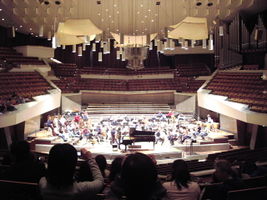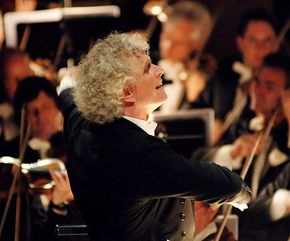Berlin Philharmonic
| Berliner Philharmoniker | |
|---|---|
 |
|
| Background information | |
| Also known as | Berlin Philharmonic |
| Origin | Berlin, Germany |
| Genres | Classical |
| Occupations | Symphony orchestra |
| Years active | 1887-present |
| Website | www.Berliner-Philharmoniker.de |
| Members | |
| Principal Conductor Simon Rattle Pianist-in-Residence András Schiff Pierre-Laurent Aimard |
|
| Past members | |
| Founder Ludwig von Brenner |
|
| Notable instruments | |
| Concert Organ Karl Schuke, Berlin IV-72 |
|
The Berlin Philharmonic (German: Berliner Philharmoniker) is an orchestra based in Berlin, Germany. In 2006, a group of ten European media outlets voted the Berlin Philharmonic number three on a list of "top ten European Orchestras", after the Vienna Philharmonic and the Royal Concertgebouw Orchestra,[1] while in 2008 it was voted the world's number two orchestra in a survey among leading international music critics organized by the British magazine Gramophone (behind the Concertgebouw).[2] Its primary concert venue is the Philharmonie, located in the Kulturforum area of the city. Since 2002, its principal conductor is Sir Simon Rattle. The BPO also supports several chamber music ensembles. The funding for the organization is subsidized by the city of Berlin and a partnership with Deutsche Bank.
Contents |
History

The Berlin Philharmonic Orchestra was founded in Berlin in 1882 by 54 musicians under the name Frühere Bilsesche Kapelle (literally, "Former Bilse's Band"); the group broke away from their previous conductor Benjamin Bilse after he announced his intention of taking the band on a fourth-class train to Warsaw for a concert. The orchestra was renamed and reorganized under the financial management of Hermann Wolff in 1887. Their new conductor was Ludwig von Brenner; in 1887 Hans von Bülow, one of the most esteemed conductors in the world, took over the post. This helped to establish the orchestra's international reputation, and guests Hans Richter, Felix von Weingartner, Richard Strauss, Gustav Mahler, Johannes Brahms and Edvard Grieg conducted the orchestra over the next few years. Programmes of this period show that the orchestra possessed only 46 strings, much less than the Wagnerian ideal of 64.
In 1895, Arthur Nikisch became chief conductor, and was succeeded in 1923 by Wilhelm Furtwängler. Despite several changes in leadership, the orchestra continued to perform throughout World War II. After Furtwängler fled to Switzerland in 1945, Leo Borchard became chief conductor. This arrangement lasted only a few months, as Borchard was accidentally shot and killed by the American forces occupying Berlin. Sergiu Celibidache then took over as chief conductor for seven years, from 1945 to 1952. Furtwängler returned in 1952 and conducted the orchestra until his death in 1954.
His successor was Herbert von Karajan, who led the orchestra from 1955 until his resignation in April 1989, only months before his death. Under him, the orchestra made a vast number of recordings and toured widely, growing and gaining fame. When Karajan stepped down, the post was offered to Carlos Kleiber, but he declined.
Claudio Abbado became principal conductor after Karajan, expanding the orchestra's repertoire beyond the core classical and romantic works into more modern 20th century works. He stepped down from this post in 2002 to conduct the Lucerne Festival Orchestra. During the post-unification period, the orchestra encountered financial problems resulting from budgetary stress in the city of Berlin.[3] In 2006, the Orchestra Academy of the Berlin Philharmonic established the Claudio Abbado Composition Prize in Abbado's honour.[4]

In June 1999, the musicians elected Sir Simon Rattle as their next chief conductor.[5] Rattle made it a condition of his signing with the Berlin Philharmonic that it be turned into a self-governing public foundation, with the power to make its own artistic and financial decisions. This required a change to state law, which was approved in 2001, allowing him to join the organization in 2002. Rattle's contract with the orchestra was initially through 2012. In April 2008, the BPO musicians voted in favour of retaining Rattle as their chief conductor.[6] From 2006 to 2010 the general manager of the orchestra was Pamela Rosenberg. In April 2008, the orchestra announced that Rosenberg would not continue as general manager after the expiration of her contract in 2010.[7] As of September 2010 the new general manager will be German media manager Martin Hoffmann.[8]
In 2006, the orchestra announced it would investigate its role during the Nazi regime.[9] In 2007, Misha Aster published The Reich's Orchestra, his study of the relationship of the Berlin Philharmonic to the rulers of the Third Reich.[10] Also in 2007 the documentary film The Reichsorchester by Enrique Sánchez Lansch was released.[11]
The first concert hall of the orchestra was destroyed in 1944. Since 1963, the orchestra has been resident at the Philharmonie, which was constructed from 1960-1963, following the design of architect Hans Scharoun. On 20 May 2008, a fire broke out at the Philharmonie. One-quarter of the roof underwent considerable damage as firefighters cut openings to reach the flames beneath the roof.[12] [13] The hall interior also sustained water damage, but was otherwise "generally unharmed." The firefighters limited damage by the use of foam. The orchestra was restricted from use of the hall for concerts until June 2008.[14]
UNICEF appointed the Berlin Philharmonic Orchestra and Sir Simon Rattle as Goodwill Ambassadors in November 2007.[15]
On 18 December 2008 the Orchestra announced the creation of a Digital Concert Hall: this new Internet platform will enable music fans all over the world to see and hear the Philharmonic’s concerts – live or on demand.[16]
Principal conductors
|
|
Awards and recognition
- Classical BRIT Awards
-
- 2001 - "Ensemble/Orchestral Album of the Year" - Sir Simon Rattle, Mahler: Symphony No. 10 (EMI, 2000)
- 2003 - "Ensemble/Orchestral Album of the Year" - Sir Simon Rattle, Mahler: Symphony No. 5 (EMI, 2002)
-
- 1970 - Best Opera Recording - Herbert von Karajan, Helga Dernesch, Thomas Stolze, Jess Thomas, Wagner: Siegfried (DGG, 1969)
- 1979 - Best Orchestral Performance - Herbert von Karajan, Beethoven: Symphonies (9) (Complete)
- 1993 - Best Orchestral Recording - Leonard Bernstein, Mahler: Symphony No. 9 (DGG, 1992; recording 1979)
- 1995 - Best Chamber Music Performance - Daniel Barenboim, Dale Clevenger, Larry Combs, Daniele Damiano, Hansjörg Schellenberger, Beethoven/Mozart: Quintets (Chicago-Berlin) (1994)
- 1998 - Best Small Ensemble Performance - Claudio Abbado, Hindemith: Kammermusik Nr. 1 mit Finale 1921, Op. 24 No. 1 (with members of Berlin Philharmonic Orchestra) (EMI, 1996)
- 2000 - Best Classical Vocal Performance - Claudio Abbado, Anne Sofie von Otter, Thomas Quasthoff: Mahler: Des Knaben Wunderhorn (DGG, 1999)
- 2001 - Best Orchestral Performance - Sir Simon Rattle, Mahler: Symphony No. 10 (EMI, 2000)
- 2007 - Best Instrumental Soloist(s) Performance With Orchestra - Antonio Pappano, Leif Ove Andsnes: Rachmaninov, Piano Concertos 1 & 2 (EMI, 2006)
- Gramophone Awards
-
- 1981 - "Opera Recording of the Year" - Herbert von Karajan, Wagner: Parsifal (DGG, 1980)
- 1981 - "Orchestral Record of the Year" - Herbert von Karajan, Mahler: Symphony No. 9 (DGG, 1980)
- 1984 - "Record of the Year" - Herbert von Karajan, Mahler: Symphony No. 9 (DGG, 1984; live recording 1982)
- 2000 - "Orchestral Record of the Year" - Sir Simon Rattle, Mahler: Symphony No. 10 (EMI, 2000)
- 2004 - "Concerto" - Mariss Jansons, Leif Ove Andsnes, Grieg: Piano Concerto and Schumann: Piano Concerto (EMI, 2004)
- 2006 - "Record of the Year" - Claudio Abbado, Mahler: Symphony No. 6 (DGG, 2005)
- ECHO (formerly Deutscher Schallplattenpreis) of Deutsche Phono-Akademie
-
- 2003 - Chorwerkeinspielung - Sir Simon Rattle, Rundfunkchor Berlin, MDR-Rundfunkchor Leipzig, Ernst-Senff-Chor Berlin, Karita Mattila, Anne Sofie von Otter, Thomas Moser, Philip Langridge, Thomas Quasthoff: Schoenberg, Gurrelieder (EMI, 2002)
- 2006 - Musik-DVD Produktion des Jahres - Sir Simon Rattle, Thomas Grube and Enrique Sánchez Lansch (director), Uwe Dierks (producer): Rhythm Is It! (2005)
- 2006 - Sinfonische Einspielung - Claudio Abbado: Mahler, Symphony No. 6 (DGG, 2005)
- Timbre de Platine (Platinum Stamp) awarded by Opéra International magazine [1]
-
- 1987 - Riccardo Muti, Mozart: Requiem (EMI, 1987)
Current members
The members of the orchestra as of September 2009[update] are:[17]
|
|
* denotes current soloists
In popular culture
The soundtrack album for the movie 2001: A Space Odyssey offers a version of Strauss' Also sprach Zarathustra performed by the BPO conducted by Karl Böhm. (The version used in the movie itself was by the Vienna Philharmonic conducted by Karajan, uncredited, but copyright owner Decca Records didn't want to be associated with science-fiction.)
On November 19th, 1999 the BPO played with the heavy metal band Metallica in a sold-out concert at the Berlin Velodrome arena, the only European stop on the band's three-date S&M symphony tour. The orchestra was conducted by Michael Kamen. They also played with the German rock band Scorpions, on their 2000 album Moment of Glory.[18]
Members of the BPO participated with experimental metal band, The Ocean on several albums; Fluxion, Aeolian and Precambrian.
The relationship between the BPO and the Nazi regime is the subject of the movie Taking Sides.
See also
- The 12 cellists of the Berlin Philharmonic
- Music in Berlin
Books
- Annemarie Kleinert: Music at its Best: The Berlin Philharmonic. From Karajan to Rattle, BoD Publishing Company, Norderstedt 2009, ISBN 978-3-83706-361-5 (see here).
References
- ↑ (Playbill Arts) Matthew Westphal, "The Top Ten European Orchestras, According to Ten European Media Outlets", 10 October 2006. Accessed 30 May 2008.
- ↑ Tom Huizenga (2008-11-21). "Chicago Symphony Tops U.S. Orchestras". NPR. http://www.npr.org/templates/story/story.php?storyId=97291390. Retrieved 2009-01-08.
- ↑ Kate Connolly (1999-11-10). "Band of no gold". The Guardian. http://www.guardian.co.uk/g2/story/0,,255048,00.html. Retrieved 2007-08-17.
- ↑ Matthew Westphal (2006-11-06). "Berlin Philharmonic Names Winner of First Claudio Abbado Composition Prize". Playbill Arts. http://www.playbillarts.com/news/article/5540.html. Retrieved 2007-09-01.
- ↑ Andrew Clements (1999-06-24). "Picking up the baton". The Guardian. http://www.guardian.co.uk/comment/story/0,,288989,00.html. Retrieved 2007-08-17.
- ↑ Charlotte Higgins (2008-04-29). "Berlin Philharmonic keeps Rattle". The Guardian. http://music.guardian.co.uk/classical/story/0,,2276770,00.html. Retrieved 2008-04-30.
- ↑ Catherine Hickley (2008-04-24). "Rosenberg Will Leave Berlin Philharmonic; Rattle Negotiates". Bloomberg News. http://www.bloomberg.com/apps/news?pid=20601088&sid=aj.OUoFI9.Kw&refer=home. Retrieved 2008-04-28.
- ↑ "Neuer Intendant der Berliner Philharmoniker" (in German). Berlin Philharmonic. 2009-06-19. http://www.berliner-philharmoniker.de/en/magazine/titelgeschichten/title-stories/story/neuer-intendant-der-berliner-philharmoniker/. Retrieved 2010-07-28.
- ↑ Agence France-Presse (2007-05-01). "Berlin Philharmonic Orchestra to probe Nazi-era history". European Jewish Express. http://www.ejpress.org/article/16386. Retrieved 2007-08-17.
- ↑ Tony Paterson (2007-08-28). "Berlin Philharmonic 'was obedient servant of Hitler'". The Independent. http://news.independent.co.uk/europe/article2900988.ece. Retrieved 2007-09-01.
- ↑ Das Reichsorchester at the Internet Movie Database.
- ↑ Kate Connolly (2008-05-21). "Musicians flee Philharmonic fire in Berlin". The Guardian. http://music.guardian.co.uk/classical/story/0,,2281162,00.html. Retrieved 2008-05-22.
- ↑ Nicholas Kulish and Daniel J. Wakin (2008-05-21). "Fire Under Control at Home of Berlin Philharmonic". New York Times. http://www.nytimes.com/2008/05/21/world/europe/21berlin.html. Retrieved 2008-05-22.
- ↑ Daniel J. Wakin (2008-05-22). "Hall Interior in Berlin Intact After Fire". New York Times. http://www.nytimes.com/2008/05/22/arts/music/22orch.html. Retrieved 2008-05-22.
- ↑ UNICEF: UNICEF appoints Berliner Philharmoniker Goodwill Ambassador 2007-11-17.
- ↑ http://www.berliner-philharmoniker.de/en/forum/titelgeschichten/detail/story/die-berliner-philharmoniker-live-im-web/
- ↑ Berliner Philharmoniker: Orchestra. Retrieved 2009-09-07
- ↑ Michael Custodis, chapter: Moment of Glory - The Scorpions und die Berliner Philharmoniker; Innovationspotenziale. Heiner Goebbels Surrogate Cities bei Zukunft@BPhil, in: Klassische Musik heute. Eine Spurensuche in der Rockmusik, Bielefeld transcript-Verlag 2009 ISBN 978-3-8376-1249-3
External links
- Berliner Philharmoniker official website
- Berliner Philharmoniker Digital Concert Hall
- "Economic Crisis Puts the Squeeze on Arts", a 2003 Deutsche Welle article
- Discography at SonyBMG Masterworks
- www.kulturforum-berlin.com : Website about the Kulturforum am Potsdamer Platz
- Misha Aster, »Das Reichsorchester«, [2]
|
|||||
|
|||||
|
|||||